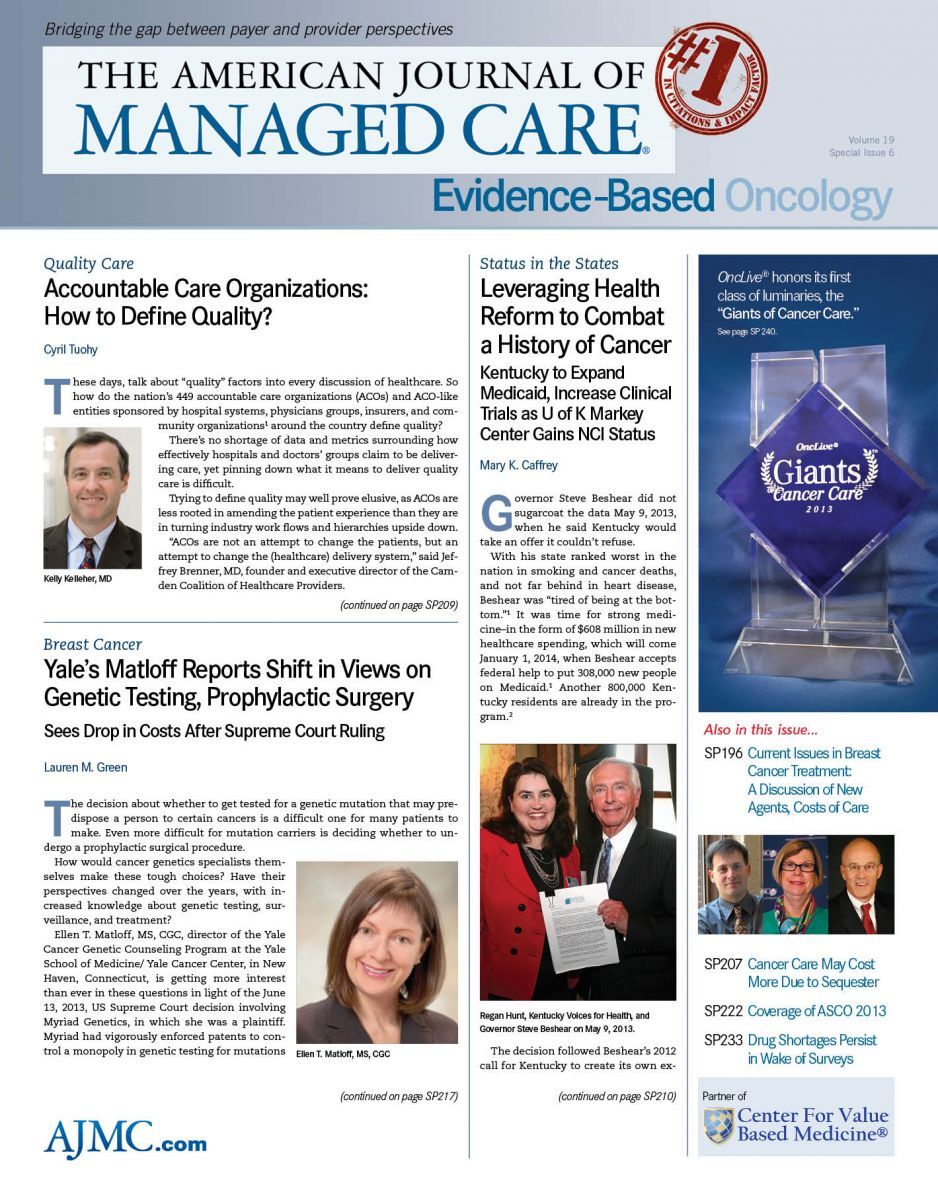- Center on Health Equity & Access
- Clinical
- Health Care Cost
- Health Care Delivery
- Insurance
- Policy
- Technology
- Value-Based Care
More Evidence for 10 Years of Tamoxifen in ER+ Breast Cancer
A British study has confirmed that 10 years of adjuvant tamoxifen substantially reduces late breast cancer recurrence and mortality among women with estrogen receptor (ER)-positive disease, supplying what investigators believe is the final piece of evidence supporting long-term use of the endocrine therapy.
The randomized, phase III aTTom study helps settle the question of whether 10 years of tamoxifen provides a benefit versus the more standard 5 years, said lead author Richard G. Gray, MA, MSc, discussing the findings at the 2013 ASCO Annual Meeting. The research was featured at a press conference and during the plenary session. “There has been quite a remarkable improvement in the benefits of tamoxifen,” said Gray, a professor of Medical Statistics at the University of Oxford in the United Kingdom, during his presentation.
“What is really impressive is the effect on breast cancer mortality.” Gray said prior research has shown that 5 years of tamoxifen reduces breast cancer recurrence and mortality by approximately one-third over a 10- to 15-year period following diagnosis. The benefits of longer treatment emerge later on, with reductions in recurrence starting to unfold after year 7 and reductions in mortality becoming evident after year 9, Gray indicated. He said the continued use of tamoxifen resulted in an additional 24% reduction in mortality after year 10.
“So, 10 years of tamoxifen compared to no tamoxifen reduces breast cancer mortality by a third in the first decade and a half in the second decade,” he said. The results of the aTTom study mirror those of the international ATLAS trial, which Gray presented at the 2012 CTRC-AACR San Antonio Breast Cancer Symposium last December. Together, the study results “provide proof beyond reasonable doubt” about the benefits of continuing tamoxifen treatment, Gray said. In the aTTom trial, 6953 women with breast cancer who had been taking tamoxifen for 5 years were randomized to continue receiving tamoxifen for another 5 years or stop taking the drug.
With follow-up of more than 10 years, there were 580 recurrences among women who had taken tamoxifen for 10 years,compared with 672 recurrences in the shorter-term treatment arm (P = .003). Moreover, there were 392 breast cancer deaths after recurrence among participants who had taken the drug for a decade, compared with 443 deaths among those in the 5-year arm (P = .05). When the results of the aTTom study and the ATLAS trial, which included 6846 women, are combined, the statistical significance of the benefits of longer tamoxifen administration are enhanced, with improvement in recurrence rates (P <.0001), breast cancer mortality (P = .002), and overall survival (P = .005), according to the aTTom abstract.
The disadvantages of taking tamoxifen for 10 years may include continuing menopausal symptoms such as night sweats and hot flashes, and rare adverse events such as an increased risk of endometrial cancer. In the aTTom trial, there were 102 cases and 37 deaths (1.1%) attributed to endometrial cancer in the 10-year tamoxifen arm, compared with 45 cases and 20 deaths (0.6%) in the 5-year group. In the United States, the trial results likely will change the standard of care for women who are premenopausal at diagnosis to include 10 years of tamoxifen, said Sylvia Adams, MD, an associate professor at New York University School of Medicine who provided commentary on the study during the press conference. US women who are postmenopausal at diagnosis typically receive an aromatase inhibitor as adjuvant treatment but they may now consider incorporating extended tamoxifen into their treatment plan, Adams said. 1. Gray RG, Rea D, Handley K, et al. aTTom: long-term effects of continuing adjuvant tamoxifen to 10 years versus stopping at 5 in 6,953 women with early breast cancer. J Clin Oncol. 013;31(suppl; abstr 5).

Exploring Racial, Ethnic Disparities in Cancer Care Prior Authorization Decisions
October 24th 2024On this episode of Managed Care Cast, we're talking with the author of a study published in the October 2024 issue of The American Journal of Managed Care® that explored prior authorization decisions in cancer care by race and ethnicity for commercially insured patients.
Listen
HEDIS Glycemic Goal Achieved Using Control-IQ Technology
December 22nd 2025A greater proportion of patients with type 1 diabetes who used automated insulin delivery systems vs multiple daily injections achieved the Healthcare Effectiveness Data and Information Set (HEDIS) glycemic measure.
Read More

